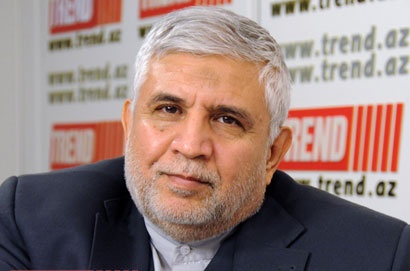Iran says has project on resolution of Nagorno-Karabakh conflict

By Sara Rajabova
The Armenia-Azerbaijan Nagorno-Karabakh conflict should be resolved in the shortest time possible, Iranian Ambassador to Azerbaijan Mohsen Pakayin said at a press conference on the occasion of Quds Day on July 31.
"The conflict has been ongoing for a long time. We have already stated that we are willing to resolve the conflict and we have a project in this regard. But, of course, the project will be made public in due time," Pakayin said.
The Iranian ambassador also said he will visit the Fizuli region and examine the Horadiz border checkpoint.
According to Pakayin, Azerbaijan and Iran have positively assessed the opening of the "Aslanduz-Horadiz" border checkpoint and discussions on the issue are underway.
Pakayin noted that he will visit Horadiz with his Azerbaijani colleagues after the month of Ramadan.
Water transfer to Lake Urmia
Pakayin also said Iran and Azerbaijan have cooperated in the use of water from Araz River for 42 years, and there is a specific agreement to that end.
He said Iran is using part of its territory to transfer water from Araz River into Lake Urmia.
The ambassador said further, "Azerbaijan's cautious approach to the issue relating to Lake Urmia is understandable. The basis of this project was laid not long ago, and two to three years are necessary for its implementation. Excessive water from Araz River will be transferred to Lake Urmia, because as a result of precipitation the water level in Araz River rises and floods occur. Thanks to a special mechanism, excessive water will be transferred to Lake Urmia."
On July 27, the opening ceremony of the project on water transfer from Araz River to Lake Urmia and the Marand plain was held with the participation of Iranian Vice President Mohammad Reza Rahimi and Energy Minister Majid Namjoo.
An investment agreement has been signed with a foreign investor in the amount of 875 million euros for the implementation of the project. The project envisions the transfer of water from Araz River to Julfa, Marand, Shabestar and Tabriz plains. Within the project, the issue of drinking water in eight towns and 81 villages will be solved.
The area of Lake Urmia is about 6,000 square kilometers. The lake's drying up has an impact on the flora and fauna of the region. Experts on environmental issues say that the measures taken by the Iranian government are not enough to save the lake.
The project on directing 600 million cubic meters of water from Araz River into Lake Urmia was launched during a visit by Iranian President Mahmoud Ahmadinejad and government officials to Tabriz in 2010. Some $1.2 billion is to be allocated to implement the project.
The Iranian government allocated $900 million for the prevention of Lake Urmia's drying up in September 2011.
Also, the United Nations Environment Program (UNEP) has allocated $135 million to Iran to resolve environmental problems with shoaling of the lake.
Palestinian problem
Speaking about the Palestinian problem, Pakayin said the occupation of Palestinian lands poses a threat to all countries in the region and all countries must focus on this issue.
Imam Khomeini declared the last Friday of Ramadan as Quds Day in 1980. Rallies are held in support of the Palestinian people on this day in Iran and some other countries every year.
Pakayin stressed that Iran has a project on liberating Palestinian territories.
"Iran proposes to hold a national referendum in the Palestinian lands," Pakayin added. "After taking part in the referendum, all citizens of Palestine will be able to determine their own destiny."
The ambassador said that the project, initiated by Iran, is not directed against Israel and the Jewish people.
"Every citizen of Palestine can determine their own fate through the implementation of this project," Pakayin said.
According to Pakayin, Israel does not want the Palestinian people to determine their destiny. All countries, including the Western ones, should support the Palestinian people, the ambassador said.
He said that the U.S. and Western countries have spent a lot of money to protect Israel.
Pakayin urged world countries, especially Muslim states, to support Iran's project for the well-being of the Palestinian people.
